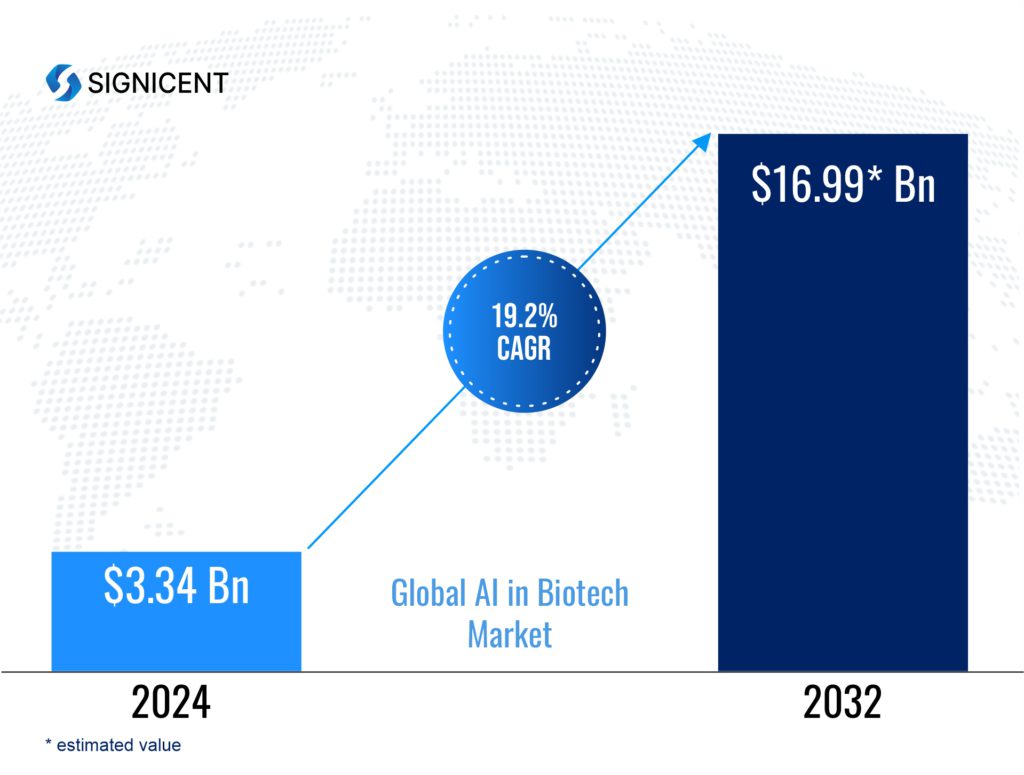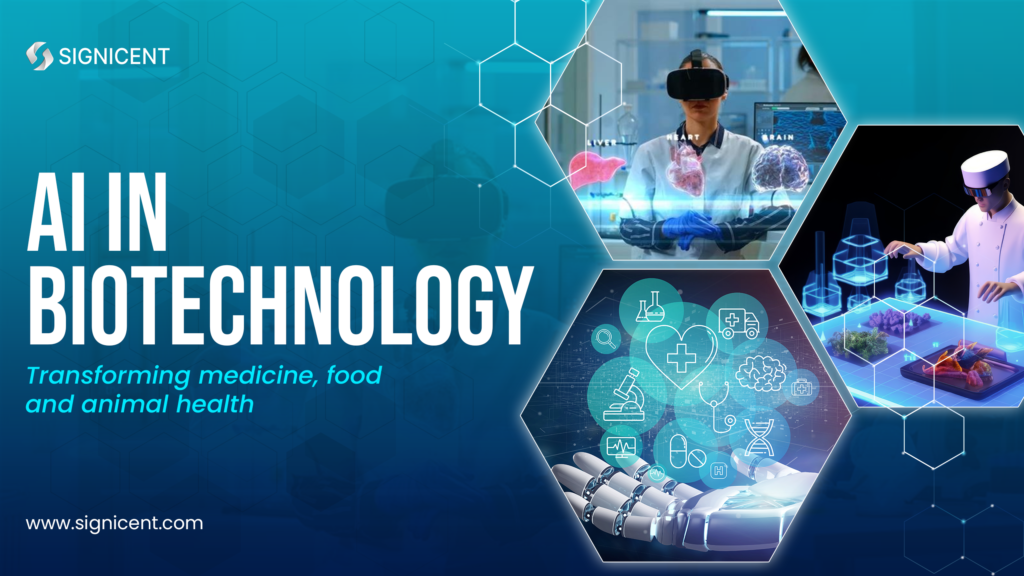Introduction- The Unresolved Challenges in Human Health
Despite decades of progress in medical science, humanity continues to face significant health challenges. Diseases like cancer, diabetes, and Alzheimer’s remain unpredictable and difficult to cure. Millions of people worldwide suffer from these conditions, often with limited treatment options and poor outcomes. Traditional medicine, while effective in some cases, often falls short in addressing the complexity of these diseases.
For instance, cancer treatments like chemotherapy and radiation therapy often come with severe side effects and are not effective for all patients. Similarly, diabetes management relies heavily on lifestyle changes and insulin therapy, but a definitive cure remains elusive. Alzheimer’s disease, which affects millions globally, still lacks effective treatments to halt or reverse its progression.
This is where AI in Biotechnology steps in. By leveraging AI, scientists and researchers are tackling some of the most pressing challenges in healthcare, food production, and animal biotechnology. From drug development to personalized medicine, AI is transforming the way we approach these problems. In this blog, we’ll explore how AI is transforming biotechnology across various segments, including medical, food, and animal biotech, and showcase real-world examples of its impact.
If you are seeking to understand the competitive landscape and identify Technology Gaps, Signicent offers Technology Landscape Analysis to map the market, and Technology Gap Analysis to provide actionable insights to strengthen your innovation pipeline.
Major Global Challenges in Medicine, Safety and Biotechnology
Key Issues Impacting Lives
Despite scientific advancements, critical health and safety challenges persist worldwide, affecting millions and demanding urgent solutions. Below are five major global challenges:
- Rising Chronic and Infectious Diseases
Global health systems struggle with rising chronic diseases like cancer and diabetes, alongside infectious outbreaks, driven by environmental, genetic, and lifestyle factors. - Inefficiencies in Drug Development
Drug discovery remains slow, costly, and inefficient due to high failure rates, lengthy trials, and the complexity of personalized medicine approaches. - Food Safety and Climate-Induced Insecurity
Climate change disrupts food production, increasing contamination risks, while global supply chain vulnerabilities threaten food security and public health. - Antibiotic Resistance and Superbugs
Overuse of antibiotics in healthcare and livestock fuels drug-resistant bacteria, limiting treatment options and increasing mortality rates worldwide. - Biotechnology Ethics and Biosecurity Risks
Advancements in genetic engineering and AI-driven biotech raise ethical concerns, potential misuse, and biosecurity threats, requiring strict regulations and global oversight.
Looking for breakthrough technologies? Technology Scouting Services by Signicent provide insights into cutting-edge developments in your industry, whether it’s biotechnology, AI, or renewable energy. We analyze the global tech landscape to find solutions that fit your goals.
What’s Possible with AI in Biotechnology?
Accelerating Drug Development
One of the most time-consuming and expensive aspects of biotechnology is drug development. Traditionally, it takes 10-15 years and billions of dollars to bring a new drug to market. AI is changing this by streamlining the process.
- AI-Powered Drug Discovery: AI algorithms can analyze vast datasets to identify potential drug candidates in a fraction of the time. For example, Insilico Medicine, a leading AI-driven biotech company, used AI to identify a novel drug candidate for fibrosis in just 46 days.
- Predictive Analytics: AI can predict how different compounds will interact with biological systems, reducing the need for extensive lab testing.
Early Disease Prediction
Early detection of diseases like cancer and diabetes can significantly improve patient outcomes. AI is making this possible through advanced data analysis and predictive modeling.
- Machine Learning in Diagnostics: AI algorithms can analyze medical images, genetic data, and patient history to predict the likelihood of diseases. For instance, Google’s DeepMind has developed AI models that can detect breast cancer from mammograms with greater accuracy than human radiologists.
- Wearable Technology: AI-powered wearables can monitor vital signs and detect anomalies, enabling early intervention.
Personalized Medicine
No two patients’ medicines are the same, and AI is helping to create personalized treatment plans based on individual genetic makeup, lifestyle, and medical history.
- Genomic Analysis: AI can analyze a patient’s genome to identify the most effective treatments. Companies like 23andMe and Color Genomics are using AI to provide personalized health insights.
- AI-Suggested Medicine: Unlike traditional medicine, which often follows a one-size-fits-all approach, AI can recommend treatments tailored to the patient’s unique needs.

Traditional Medicine VS AI-Suggested Medicine
The following table compares traditional medicine with AI-suggested medicine, showcasing how AI enhances precision, personalization, and proactive healthcare. While traditional medicine follows standardized protocols, AI-driven approaches utilize real-time data for tailored, predictive, and more effective treatments.
| Aspect | Traditional Medicine | AI-Suggested Medicine |
| Treatment Approach | Uses standardized treatment protocols for all patients. | Customizes treatment based on genetic data, medical history, and lifestyle. |
| Precision in Treatment | Involves trial-and-error before finding an effective treatment. | Uses predictive analysis to recommend effective treatments immediately. |
| Data Utilization | It depends on historical data and clinical trials. | Analyzes real-time patient data, genetic information, and research. |
| Care Model | Treats symptoms and diseases after they appear. | Identifies risks early and suggests preventive measures. |
| Patient-Centricity | Provides the same treatment for all patients with similar conditions. | Considers individual factors like genetics, environment, and health history. |
AI in Medical Biotechnology: Case Studies and Patents
Leading Companies and Startups
Several companies and startups are at the forefront of integrating AI into medical biotechnology. Here are a few notable examples:
- Moderna: Known for its mRNA-based COVID-19 vaccine, Moderna uses AI to optimize vaccine design and predict immune responses.
- BenevolentAI: This UK-based company uses AI to identify new drug targets and accelerate drug development.
- PathAI: Specializing in pathology, PathAI uses machine learning to improve diagnostic accuracy and develop new therapies.
Patents and Future Trends
The biotech industry is witnessing a surge in AI-related patents, reflecting the growing importance of this technology.
- AI-Driven Drug Discovery Patents: Companies like Pfizer and Merck have filed patents for AI-based drug discovery platforms.
- Predictive Diagnostics Patents: Patents for AI-powered diagnostic tools are on the rise, with a focus on early detection of diseases like cancer and Alzheimer’s.
- Personalized Medicine Patents: Innovations in genomic analysis and personalized treatment plans are driving a wave of new patents in this space.
If you are actively looking to understand the patent environment within your industry, Signicent offers in-depth Patent Landscape Analysis to identify current trends and future opportunities. Our expert Patent Search services will provide you with a comprehensive overview of competitive activities, and our Patent Portfolio Analysis helps you optimize and strengthen your IP assets.

AI in Food Biotechnology – Modernizing Nutrition
Sustainable Food Production
AI is playing a crucial role in addressing global food security challenges.
- Precision Agriculture: AI-powered tools can optimize crop yields by analyzing soil conditions, weather patterns, and pest activity.
- Alternative Proteins: Companies like Impossible Foods and Beyond Meat are using AI to develop plant-based meat alternatives that mimic the taste and texture of real meat.
Enhancing Food Safety
AI is also improving food safety by detecting contaminants and ensuring quality control.
- AI in Food Inspection: Machine learning algorithms can analyze images of food products to identify defects or contaminants.
- Supply Chain Optimization: AI can track food products throughout the supply chain, ensuring freshness and reducing waste.
AI in Animal Biotechnology: Improving Health and Productivity
Livestock Health Monitoring
AI is transforming animal biotechnology by improving the health and productivity of livestock.
- Wearable Devices for Animals: AI-powered wearables can monitor the health of livestock, detecting early signs of disease and improving overall well-being.
- Predictive Analytics: AI can predict disease outbreaks in animal populations, enabling timely interventions.
Genetic Engineering
AI is also being used to enhance genetic engineering in animals.
- CRISPR and AI: Combining CRISPR technology with AI allows for precise genetic modifications, leading to healthier and more productive livestock.
- Disease-Resistant Animals: AI is helping to develop disease-resistant breeds, reducing the need for antibiotics and improving food safety.
With our Chemical Structure Search, Signicent helps you identify chemical compounds or biological sequences that are crucial for your R&D process. We offer Biological Sequence Search to assist in areas like genomics, biotechnology, and pharmaceutical development.
Sustainable Benefits of Using AI in Biotechnology
AI is driving sustainability in biotechnology by minimizing resource wastage, optimizing production, and enhancing eco-friendly innovations.
- Waste Reduction: AI-powered precision agriculture and food biotechnology reduce resource waste by optimizing crop yields and minimizing spoilage.
- Eco-Friendly Drug Development: AI accelerates drug discovery, reducing the need for extensive animal testing and lowering chemical waste.
- Energy Efficiency: AI-driven bioprocessing optimizes energy usage in pharmaceutical and biotech manufacturing.
- Sustainable Livestock Management: AI improves animal health monitoring, reducing antibiotic overuse and ensuring ethical, sustainable farming.
By integrating AI, biotechnology is becoming more efficient, environmentally responsible, and future ready.
The Future of AI in Biotechnology
Emerging Trends
- AI and Robotics: The integration of AI with robotics is enabling automated lab processes, reducing human error and increasing efficiency.
- AI in Clinical Trials: AI is streamlining clinical trials by identifying suitable candidates and predicting outcomes, reducing time and costs.
Ethical Considerations
While AI holds immense potential, it also raises ethical concerns, such as data privacy and the potential for bias in algorithms. Addressing these issues will be crucial for the responsible development of AI in biotechnology.
Signicent’s Market Assessment and Valuation services help you understand the current market position of your technologies and predict future trends. Our comprehensive analysis supports your business growth by identifying profitable market opportunities.
Future Outlook – Emerging Trends in AI-Driven Biotechnology
The future of AI in biotechnology extends beyond current applications, with innovations set to redefine the industry:
- AI-powered biomaterials: AI aids in designing sustainable bioplastics and regenerative biomaterials.
- Digital twins in biotech: AI-driven digital twins simulate human biology for drug testing and personalized medicine.
- AI in regenerative medicine: AI optimizes stem cell therapies and tissue engineering, advancing organ regeneration.
According to Signicent’s market research, the global AI in biotechnology market is expected to reach projected value ranges, driven by advancements in AI-driven drug development, personalized medicine, and precision healthcare technologies.

Leading Key Players
Here are the top five AI-driven biotechnology companies, ranked by their market capitalization as of 2025:

These companies are at the forefront of integrating artificial intelligence with biotechnology, driving innovation in drug discovery, personalized medicine, and other healthcare solutions.
Signicent has made significant contributions to the field of innovation, particularly through advanced research and development strategies. Recently, Signicent played a key role in solving syrup mapping challenges in healthcare by implementing enhanced research techniques and specialized methodologies. With a focus on patents and cutting-edge solutions, Signicent has demonstrated expertise in navigating complex healthcare issues and providing actionable insights.
For organizations seeking advanced research tactics and deep technological insights, Signicent offers tailored services that drive innovation and support critical decision-making. Connect with Signicent for more information on how we can help advance your business through impactful R&D and patent landscape analysis.
Conclusion – A New Era of Biotechnology
AI is driving significant changes in biotechnology, providing advanced solutions to major challenges in drug development, disease prediction, personalized medicine, and sustainable food production. These innovations are reshaping the industry, enabling more precise and effective treatments. As companies and startups continue to push the boundaries of what’s possible, the future of biotechnology holds great promise. By adopting AI, we can overcome the limitations of traditional medicine and create a healthier, more sustainable world.
If you are actively striving for technological solutions and need industry insights, feel free to contact me at Signicent. We specialize in Patent Landscape Analysis, Technology Scouting, and more.
About Signicent LLP
We assist businesses globally in their technology innovations, R&D, new product development, patents, valuation, product commercialization & market research needs.
Services Offered:
- Patent Landscape
- Patent Portfolio Analysis
- Patent Invalidity Search
- Patent Licensing Services
- Freedom to operate (FTO)
- Chemical Structure Search
- Design Patent Search
- Technology Scouting
- Technology Landscape Analysis
- Technology gap analysis
- Technology Intelligence
- Market Research
- Bio Sequence Search
- Manufacturers Search/ Supplier search
Elevate your Innovation and Research with Signicent’s cutting edge approach to assist you with Technology and Market related matters alongside the IP aspect of the analysis.


